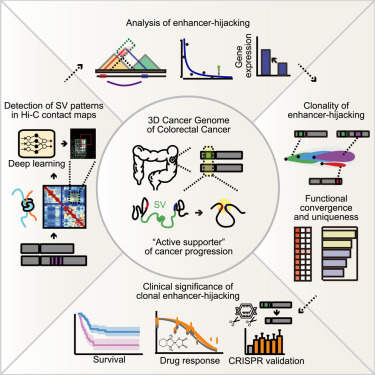The first three-dimensional (3D) genome map of Korean colon cancer patients has been released.
The Korea Advanced Institute of Science and Technology (KAIST) said Monday that a research team led by Professor Jung In-kyung of the Department of Biological Sciences has presented the first 3D genome map of Korean colon cancer patients using an artificial intelligence-based algorithm.
Professor Kim Tae-you of the Seoul National University's Cancer Research Institute conducted the study jointly.

The team developed an AI-based algorithm to create a 3D genome map of colorectal cancer using the high-throughput chromosome conformation capture (Hi-C) experimental technique, which measures interactions between genomes and analyzes specific 3D genomic changes for each patient.
As a result, they identified a wide range of 3D genomic structure changes and the activation of various oncogenes.
Until now, some cancer cell line 3D genome structure studies have been reported. However, large-scale patient studies have not been performed due to various problems, including cell heterogeneity in tissues, tumor purity, and cancer cell heterogeneity.
In this study, the researchers could interpret complex signals from individual patient tumor tissues using an AI-based algorithm. As a result, they could make a 3D genome map using tumor tissues from 40 patients and adjacent normal colon tissues, the largest study to date. It was the first 3D genome map of tumor tissues from Koreans.
"These results could be crucial for understanding tumor heterogeneity among cancer patients, paving the way for research on personalized medicine," Kim said.
Professor Jeong said, "Our results provide a new approach to reinterpreting cancer genomes from the perspective of 3D genome structure and discovering new cancer targets difficult to explain using traditional point mutations or genomic variants alone."
The paper, "Spatial and clonality-resolved 3D cancer genome alterations reveal enhancer-hijacking as a potential prognostic marker for colorectal cancer," was published on July 13 in the international journal Cell Reports.

